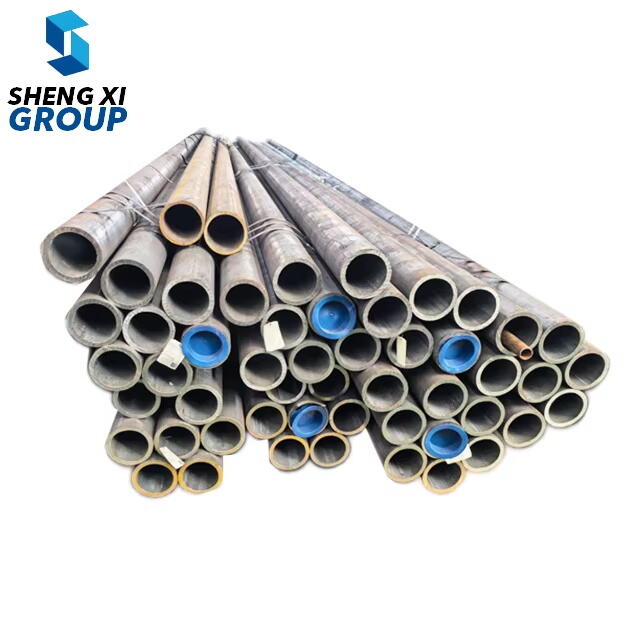Einführung: Warum die Auswahl der richtigen Legierungsstahlröhre wichtig ist
Die richtige Legierungsstahlrohrleitung auszuwählen, ist für Industrien, die auf Rohrleitungssysteme angewiesen sind, von großer Bedeutung. Diese speziellen Rohre werden in Bereichen wie Bohrinseln, Kraftwerken und chemischen Fabriken eingesetzt, wo normale Materialien einfach nicht ausreichen. Was macht Legierungsstahl so wertvoll? Nun, er kommt ziemlich gut mit widrigen Bedingungen zurecht – denke an extreme Druckverhältnisse, glühende Hitze und chemische Substanzen, die Oberflächen angreifen. Ohne geeigneten Legierungsstahl würden viele industrielle Anlagen im Laufe der Zeit einfach versagen oder sogar ernsthafte Sicherheitsrisiken darstellen. Wenn Unternehmen den falschen Typ Legierungsstahl wählen, führt dies oft zu kostspieligen Reparaturen in der Zukunft. Die Beschäftigung mit verschiedenen Legierungs zusammensetzungen und das Wissen, was für spezifische Anwendungen am besten geeignet ist, ist nicht nur gute Praxis; es ist tatsächlich eine kluge Geschäftsentscheidung, die langfristig Kosten spart und gleichzeitig die Sicherheit der Mitarbeiter gewährleistet.
Die entscheidende Rolle von Legierungsstahlröhren in industriellen Anwendungen
Aluminiumstahlrohre spielen in verschiedenen Branchen wie Öl- und Gas, Energieerzeugung und chemischen Anlagen eine große Rolle. Das Besondere an diesen Rohren ist ihre Fähigkeit, extremen Druck- und Temperaturverhältnissen standzuhalten, was dafür sorgt, dass Systeme sicher bleiben und Strukturen im Laufe der Zeit stabil bleiben. Nehmen wir beispielsweise den Öl- und Gasbereich. Raffinerien und Bohrstellen sind stark auf diese Rohre angewiesen, da sie Tag für Tag extrem rauen Bedingungen ausgesetzt sind. Auch Kraftwerke benötigen diese Rohre, da sie heißes Dampf und überhitze Gase durch komplexe Leitungsnetze transportieren. Und dann gibt es noch die chemische Verarbeitung, bei der diese Rohre direkt mit aggressiven Stoffen in Kontakt kommen, die normale Materialien zerstören würden. Die richtige Auswahl der Legierung ist nicht einfach nur das Austauschen eines alten Rohres. Die falsche Wahl kann später zu zahlreichen Problemen führen. Eine passende Legierung sorgt bereits ab dem ersten Tag für bessere Leistung, längere Nutzungsdauer bis zur Erneuerung und insgesamt reibungslose Abläufe, ohne dass unerwartete Ausfälle Produktionspläne stören.
Folgen einer schlechten Materialauswahl
Die falschen Materialien auszuwählen, führt oft zu großen Problemen und verursacht Kosten für spätere Reparaturen. Wenn für Rohrleitungssysteme ein ungeeigneter Stahlguss gewählt wird, haben wir bereits alles von kleinen Lecks bis hin zu schwerwiegenden Explosionen erlebt. Deshalb ist es so wichtig, die richtigen Standards einzuhalten und Expertenmeinungen von Personen einzuholen, die sich tatsächlich damit auskennen. Wenn Materialien versagen, müssen Anlagen während der Reparaturarbeiten stillgelegt werden, es gibt Geldstrafen aufgrund von Sicherheitsverletzungen und im schlimmsten Fall wird sogar jemand verletzt. Branchenberichte zeigen, dass etwa 30 % der Ausfälle von Ausrüstungen auf falsch gewählte Materialien zurückzuführen sind. Für Unternehmen, die ohne ständige Unterbrechungen arbeiten möchten, macht es sowohl finanziell als auch betrieblich Sinn, von Anfang an ausreichend Zeit in die Auswahl der richtigen Stahlgüten zu investieren.
Verständnis der Anwendungsanforderungen: Druck, Temperatur und Umgebung
Beurteilung der Druckanforderungen für sichere Betriebsbedingungen
Ein gutes Verständnis darüber, welcher Art von Druck eine Anwendung benötigt, bildet die Grundlage für einen sicheren Betrieb. Industrielle Prozesse haben jeweils unterschiedliche Druckanforderungen, und die Nichterfüllung dieser Spezifikationen führt oft zu Problemen wie Lecks oder Rohrbrüchen, die alles zum Erliegen bringen. Rohre aus legiertem Stahl sind in verschiedenen Druckklassen erhältlich, sodass Ingenieure das passende Modell für ihre jeweilige Anlage auswählen können. Wenn jemand tatsächlich den maximalen Arbeitsdruck berechnet, stellt sie oder er sicher, dass diese Rohre unter normalen Betriebsbedingungen nicht unter Belastung versagen und dabei gleichzeitig die Sicherheitsreserven sowie die Gesamtleistung des Systems gewahrt bleiben.
Temperaturbereich und thermische Spannungsüberlegungen
Die Temperaturbereiche während des Betriebs haben einen erheblichen Einfluss auf das mechanische Verhalten von Legierungsstahlrohren. Bei der Auswahl von Materialien für Rohrleitungssysteme ist das Verständnis dieser Temperaturgrenzen für die Leistung unter wechselnden Bedingungen ziemlich wichtig. Höhere Temperaturen führen zwangsläufig zu vermehrter thermischer Ausdehnung, was Probleme wie Verformungen oder Spannungsrisse verursachen kann, sofern Ingenieure dies in ihren Konstruktionen nicht richtig berücksichtigen. Für Installationen, bei denen vor allem Widerstandsfähigkeit gegen Hitze entscheidend ist, macht die Wahl von Legierungen, die speziell zur Bewältigung extremer Temperaturen entwickelt wurden, den entscheidenden Unterschied. Diese spezialisierten Zusammensetzungen tragen dazu bei, die strukturelle Integrität auch bei hohen Temperaturen aufrechtzuerhalten und gewährleisten so einen reibungslosen Ablauf industrieller Prozesse ohne Sicherheitsrisiken auf lange Sicht.
Umweltfaktoren: Korrosions- und Verschleißbeständigkeit
Feuchtigkeitswerte, chemische Substanzen in der Luft oder im Wasser sowie Temperaturschwankungen spielen alle eine wesentliche Rolle dabei, wie lange Stahlgussrohre halten und wie gut sie im Laufe der Zeit funktionieren. Wenn Ingenieure wissen, welcher Art von Umgebung diese Rohre täglich ausgesetzt sind, können sie genau ermitteln, welches Schutzniveau gegen Rost und Abnutzung erforderlich ist. Einige spezielle Legierungen sind gezielt dafür entwickelt worden, besser gegen Korrosion standzuhalten, was bedeutet, dass diese Rohre in der Regel wesentlich länger halten, bevor Reparaturen oder Austausch notwendig werden. Dies führt direkt zu niedrigeren Wartungskosten auf lange Sicht und sorgt gleichzeitig dafür, dass die Betriebsabläufe über viele Jahre hinweg reibungslos verlaufen. Für alle, die mit industriellen Rohrleitungssystemen arbeiten, bleibt die Auswahl des richtigen Stahlgusstyps auf Grundlage der lokalen Umweltbedingungen unverzichtbar, um die strukturelle Stabilität sowie die Gesamtleistung des Systems in verschiedenen Umgebungen zu gewährleisten.
Kennen Sie die Legierungstypen: Stufungen und deren Eigenschaften
Niedriglegierte vs. Hochlegierte Stahlröhren: Hauptunterschiede
Es ist wichtig, den Unterschied zwischen niedriglegierten und hochlegierten Stahlrohren zu kennen, wenn Materialien für industrielle Anwendungen ausgewählt werden. Niedriglegierte Rohre enthalten nur geringe Mengen an zusätzlichen Metallen, weshalb sie günstiger sind, aber weniger widerstandsfähig in anspruchsvollen Situationen. Sie sind für normale Anwendungen geeignet, versagen jedoch oft unter extremen Temperaturen oder hohem Druck. Hochlegierte Stähle erzählen dagegen eine andere Geschichte. Diese enthalten deutlich mehr der speziellen Elemente, die ihnen Widerstandsfähigkeit gegen harte Bedingungen verleihen. Selbstverständlich ist der Preis dafür deutlich höher als bei niedriglegierten Alternativen. Für alle, die mit ernsthaften industriellen Herausforderungen konfrontiert sind, ist es wichtig zu verstehen, wie diese Zusammensetzungen die Leistung beeinflussen, um für spezifische Arbeiten vor Ort das optimale Material auszuwählen.
Häufige Ausführungen: P5, P9, P11 und P91
Die Kenntnis der üblichen Güteklassen wie P5, P9, P11 und P91 macht beim Auswählen von Legierungsstahlrohren für spezifische Anwendungen einen großen Unterschied. Diese verschiedenen Güteklassen wurden mit bestimmten Vorteilen im Blick entwickelt. Nehmen wir beispielsweise P5: Es zeichnet sich durch eine starke Widerstandsfähigkeit gegen hohe Temperaturen aus, was erklärt, warum es gerade in anspruchsvollen Umgebungen wie Kraftwerken hervorragend eingesetzt wird. Praxisnahe Tests und etablierte Industriestandards zeigen genau, wie jede Güteklasse unter unterschiedlichen Betriebsbedingungen abschneidet, und helfen dabei herauszufinden, wo sie in verschiedenen Branchen am besten eingesetzt werden können. Wenn Fachleute erst einmal verstehen, welche Vorteile jede Güteklasse bietet, sind sie deutlich besser in der Lage, Materialien auszuwählen, die tatsächlich für die jeweiligen Projektanforderungen geeignet sind.
Speziallegierungen für extreme Bedingungen
Wenn es um Situationen geht, bei denen zusätzlicher Schutz gegen Hitze, Rost oder Abnutzung erforderlich ist, werden spezielle Metalllegierungen unverzichtbar. Viele dieser besonderen Metalle enthalten viel Chrom und Nickel, was ihnen dabei hilft, in rauen Umgebungen deutlich besser standzuhalten als herkömmliche Materialien. Edelstahl beispielsweise eignet sich hervorragend für Anwendungen, bei denen Metallflächen ständig Feuchtigkeit und Chemikalien ausgesetzt sind. Legierungen mit hohem Chromgehalt hingegen glänzen besonders in extrem heißen Umgebungen, wie beispielsweise in Öfen oder Abgassystemen. Die richtige Legierungszusammensetzung macht den entscheidenden Unterschied für Maschinen, die unter widrigen Bedingungen arbeiten. Standardmaterialien reichen einfach nicht mehr aus, wenn Geräte Jahre lang extremen Bedingungen standhalten müssen, die herkömmliche Bauteile rasch zerstören würden.
Prüfen Sie Branchenstandards: ASTM-, ASME- und ISO-Zertifizierungen
ASTM-Standards für Materialzusammensetzung
ASTM legt Spezifikationen dafür fest, welche Materialien bei der Herstellung von Legierungsstahlrohren verwendet werden, wodurch Konsistenz und Zuverlässigkeit während der gesamten Produktionsprozesse gewährleistet bleiben. Wenn Unternehmen diesen ASTM-Standard folgen, versprechen sie im Grunde, dass ihre produkte die Mindestsicherheitsanforderungen und Qualitätsniveaus erreichen, die beispielsweise im Bau von Infrastrukturen oder in der Ölraffinerie-Branche eine entscheidende Rolle spielen. Es ist nicht nur eine Frage der Einhaltung von Vorschriften, auf dem Laufenden zu bleiben, wie sich diese Standards im Laufe der Zeit verändern. Für Rohrhersteller und Materiallieferanten kann die Kenntnis aktueller ASTM-Updates oftmals der Unterschied zwischen Wettbewerbsfähigkeit und dem Zurückbleiben hinter Konkurrenten bedeuten, die schneller auf neue Branchenerwartungen reagieren.
ASME-Konformität für Druckanwendungen
ASME legt die Regeln fest, wie Legierungsstahlrohre gestaltet, hergestellt und getestet werden müssen, wenn sie unter Druck stehen. Die Einhaltung dieser Standards ist besonders in Branchen wie Öl und Gas von großer Bedeutung, da Unfälle schwerwiegende Folgen haben können. Wenn Unternehmen den ASME-Richtlinien folgen, können sie zukünftige Rechtsstreitigkeiten vermeiden und gleichzeitig das Vertrauen von Kunden und Partnern stärken, die sicherstellen möchten, dass ihre Ausrüstung strengen Sicherheitskriterien entspricht. Alle mit mir gesprochenen Mitarbeiter von Ölfeldern betonten, dass die Einhaltung der ASME-Spezifikationen nicht nur gute Praxis ist, sondern heutzutage quasi eine Grundvoraussetzung. Ohne angemessene Einhaltung riskieren Anlagen alles von Produktionsstilllegungen bis hin zu schwerwiegenden Sicherheitsvorfällen, die Millionen an Schadenskosten und verlorenen Geschäftsmöglichkeiten verursachen können.
ISO-Zertifizierung und globale Qualitätsicherung
Die ISO-Zertifizierung zeigt, dass ein Unternehmen wirklich Wert auf Qualität und Zuverlässigkeit legt – Faktoren, die auf den heutigen globalen Märkten eine große Rolle spielen. Wenn Hersteller diese Zertifizierung für Legierungsstahlrohre erhalten, beweisen sie damit, dass diese Produkte alle internationalen Sicherheits- und Leistungsanforderungen erfüllen. Dies eröffnet Türen zu neuen Märkten weltweit. Unternehmen, die sich von Wettbewerbern abheben möchten, stellen häufig fest, dass Investitionen in die ISO-Zertifizierung sich auf verschiedene Weisen lohnen. Die Abläufe in der Produktion laufen effizienter, und die Marke gewinnt an Sichtbarkeit im Markt. Die Einhaltung globaler Qualitätsstandards hilft zudem, zukünftige Probleme zu vermeiden und Kunden zu zeigen, dass das Unternehmen zu seinen Produkten steht und diese als hochwertige Artikel betrachtet, denen man vertrauen kann.
Qualität und Lieferantenzuverlässigkeit bewerten
Nichtzerstörende Prüfverfahren (NDT)
Prüfverfahren, die Materialien nicht beschädigen, sind entscheidend, um die Qualität von Legierungsstahlrohren zu überprüfen. Die Industrie verlässt sich auf Methoden wie Ultraschallprüfungen und Radiografie, um Probleme sowohl im Inneren als auch an der Oberfläche dieser Rohre zu erkennen. Die Ultraschallprüfung eignet sich hervorragend, um verborgene Fehler unterhalb der Oberfläche aufzuspüren, während radiografische Verfahren klare Bilder davon liefern, was sich sowohl außen als auch innerhalb des Materials befindet. Wenn Unternehmen tatsächlich regelmäßige Prüfpläne mit diesen zerstörungsfreien Verfahren umsetzen, reduzieren sie Ausfälle deutlich. Dies macht insbesondere in Bereichen einen großen Unterschied, in denen Rohrleitungsversagen erhebliche Sicherheitsprobleme oder kostspielige Stillstände verursachen können.
Materialverfolgbarkeit und Dokumentation
Die Materialrückverfolgung spielt eine entscheidende Rolle dabei, die Qualität und Sicherheitsstandards für Rohrleitungssysteme aus Legiertem Stahl aufrechtzuerhalten. Wenn Unternehmen detaillierte Aufzeichnungen darüber führen, woher ihre Rohre stammen und was während der Produktion mit ihnen geschehen ist, fördert dies das Vertrauen zwischen Lieferanten und Kunden. Zudem verlangen viele Regulierungsbehörden mittlerweile tatsächlich diese Art der Dokumentation. Eine gute Papierspur stellt sicher, dass alle Beteiligten genau wissen, welches Material sie erhalten und ob es alle geforderten Spezifikationen wie ASTM- oder API-Standards erfüllt. Für Unternehmen, die in stark regulierten Umgebungen wie Offshore-Bohrplattformen oder Raffinerien tätig sind, ist das Vorhandensein dieser Informationen nicht mehr nur eine gute geschäftliche Praxis, sondern nahezu zwingend erforderlich, um den branchenspezifischen Vorschriften zu entsprechen.
Lieferanten-Ruf und Branchenkenn Know-how
Die Zusammenarbeit mit vertrauenswürdigen Lieferanten macht den entscheidenden Unterschied, wenn es darum geht, hochwertige Legierungsstahlrohre zu beschaffen. Diese Anbieter, die bereits viel Erfahrung haben, kennen sich bestens mit den Branchenstandards aus. Sie sind tatsächlich in der Lage, Produkte bereitzustellen, die exakt den Anforderungen verschiedener Industrien entsprechen. Und ganz ehrlich, niemand möchte Probleme durch minderwertige Materialien. Deshalb haben Unternehmen mit solidem Ruf in der Regel weniger Probleme auf lange Sicht. Wenn Firmen mit solchen Lieferanten zusammenarbeiten, legen sie damit den Grundstein für Erfolg. Die Rohre erfüllen selbstverständlich die Qualitätsstandards, aber da ist noch etwas anderes im Spiel. Projekte laufen insgesamt reibungsloser, weil alle Beteiligten von Beginn bis Ende genau wissen, was zu tun ist.
FAQ
Welche Branchen verwenden Legierungsstahlröhren?
Legierungsstahlröhren werden vor allem in Branchen wie Öl- und Gasindustrie, Energieerzeugung und Chemieverarbeitung eingesetzt, da sie in der Lage sind, hohe Drücke, Temperaturen und korrosive Umgebungen zu bewältigen.
Warum ist die Auswahl von Legierungsstahlröhren entscheidend?
Die Auswahl ist entscheidend, weil das richtige Legierungssicherstellt, dass das Rohrsystem den Anforderungen an Druck, Temperatur und Umwelteinflüsse gerecht wird, was die Zuverlässigkeit erhöht und Ausfälle verhindert.
Was sind ASTM- und ASME-Normen?
ASTM legt Leitlinien für die Materialzusammensetzung fest, während ASME Normen für das Entwerfen und Testen in Druckleitungen bietet. Beide zielen darauf ab, Sicherheit und Qualität in der Industrieausrüstung zu gewährleisten.
Inhaltsverzeichnis
- Einführung: Warum die Auswahl der richtigen Legierungsstahlröhre wichtig ist
- Verständnis der Anwendungsanforderungen: Druck, Temperatur und Umgebung
- Kennen Sie die Legierungstypen: Stufungen und deren Eigenschaften
- Prüfen Sie Branchenstandards: ASTM-, ASME- und ISO-Zertifizierungen
- Qualität und Lieferantenzuverlässigkeit bewerten
- FAQ


